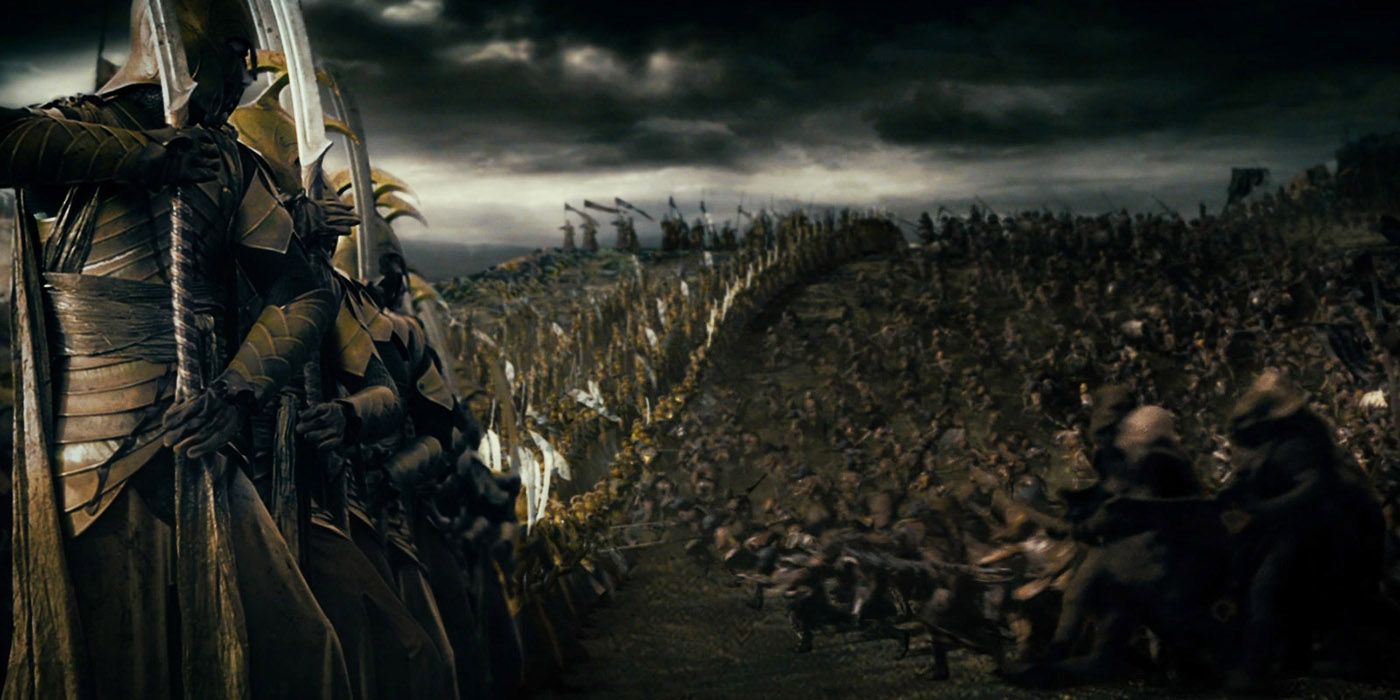J.R.R. Tolkien's son, Christopher Tolkien, recently announced his retirement as director of the Tolkien Estate, a position he's held since his father passed away in 1973. Christopher is one of his father's staunchest supporters and he's earned himself the reputation of being a Tolkien purist over the years, believing that nothing could surpass the original books (or his own works). In many ways, Christopher retiring from his position at the Tolkien Estate is similar to George Lucas stepping away from Lucasfilm and the Star Wars franchise; therefore, allowing Disney to continue telling more stories on their own.
The Hobbit and The Lord of the Rings are by far J.R.R. Tolkien's most famous literary works, especially due to Peter Jackson's movie trilogies, but Tolkien's Legendarium is much more expansive than most fans may realize - and much of that is recounted in The Silmarillion; a collection of stories that tell the history of Middle-Earth, from the universe's creation up until the Fourth Age. J.R.R. Tolkien, unfortunately, had died before he could finish The Silmarillion, which he initially planned on publishing alongside The Return of the King. Christopher took it upon himself to finish the book and have it published a few years after his father's death, as he did with numerous other unpublished Tolkien stories.
Related: Lord of the Rings Shows Better Than Remaking the Movies
The Silmarillion contains some of the most intriguing tales from Tolkien's Legendarium, though its encyclopedic nature is why many consider the book unfilmable. Still, a live-action adaptation of the book is something that many Tolkien fans have been clamoring for since Jackson's Lord of the Rings trilogy first hit the big screen. However, Christopher has spent the past few decades preventing anyone, especially Jackson, from adapting the book into any form of media. But his retirement may have just opened the floodgates. Considering that Jackson has taken charge of both The Lord of the Rings and The Hobbit trilogies, could Christopher's retirement bring him back into the fold for an adaptation of The Silmarillion?
Christopher Tolkien vs. Peter Jackson
Peter Jackson's The Lord of the Rings trilogy is regarded as one of the greatest movie trilogies ever made. The films were both critically and commercially successful, having grossed just under $3 billion at the worldwide box office against an estimated total production budget of $281 million. The Fellowship of the Ring was nominated for 13 Oscars and is, thus, one of the most Oscar-nominated movies of all-time (the record is 14 nominations, co-held by La La Land). What's more, The Return of the King currently holds the record for highest Oscar sweep, winning in all 11 categories (including Best Director and Best Picture) it was nominated for.
Despite the trilogy's undeniable success, Christopher Tolkien felt that the movies were somewhat of a mockery of his father's tales, saying that they had been turned into action movies for young audiences and had, thus, lost the novels' elegance and sophistication. It's not an exaggeration to say that Christopher despised Jackson. And so, every time the topic came up about Jackson adapting The Silmarillion, the filmmaker would deflect the question by saying that the rights remained with the Tolkien Estate - and Christopher wasn't remotely interested in discussing potential adaptations with anyone.
To make matters worse, the Tolkien Estate and Warner Bros. were locked in a seemingly never-ending lawsuit that finally resolved amicably in summer 2017. The Estate asserted that the studio and Tolkien Enterprises had breached their contract by making Lord of the Rings-themed casino and video games. What's more, Christopher was bothered by the fact that Jackson's films had become the go-to source of inspiration for fantasy, not Tolkien's novels. Christopher wasn't wrong; the vast majority of video games, such as Warner Bros. Interactive's Middle-Earth series, take inspiration from Jackson's films, not necessarily from the books themselves - and that leads to continuity errors and false representations. The lawsuit only exasperated Christopher's contempt for Jackson, and although the lawsuit was resolved, it appeared that The Silmarillion movie was no closer to happening - until now.
Does Christopher Tolkien's Retirement Mean The Silmarillion Could Happen?
Film rights in Hollywood mean everything. A studio that holds the movie and TV rights to certain properties - such as 20th Century Fox retaining the rights to the X-Men and the Fantastic Four - can exploit the IP for years on end, so that the rights never revert back to the original owners. J.R.R. Tolkien and the Tolkien Estate sold off the film rights to The Hobbit and The Lord of the Rings in the '60s. The Lord of the Rings rights' were initially sold to United Artists in 1969 and were later acquired by The Saul Zaentz Company, which now operates under the name Tolkien Enterprises.
Tolkien Enterprises (which is separate from the Tolkien Estate) retains the worldwide exclusive rights to various elements of Tolkien's Middle-Earth and they have been in charge of licensing the books' film, TV, and merchandising rights to various companies for years, including New Line Cinema, who co-produced Jackson's Lord of the Rings and The Hobbit trilogies. However, the reason they didn't pursue an adaptation of The Silmarillion is because that book's rights remain with the Tolkien Estate since the book was originally published in 1977, one year after Tolkien Enterprises acquired the rights - and Christopher Tolkien refused to sell off the rights, especially after seeing Jackson's supposedly abominable films.
Christopher used his authority to obstruct Warner Bros. from adapting his father's works beyond the studio's two movie trilogies - and that's why the announcement of Amazon Studios making a TV series set between the events of The Hobbit and The Lord of the Rings so surprising; it couldn't have been a coincidence. Christopher Tolkien's retirement, essentially, means it's open season on Middle-Earth. He spent the vast majority of his career preventing his father's stories from being adapted into virtually any medium, and now the Tolkien Estate is free to monetize Tolkien's Legendarium however they see fit. Amazon's Lord of the Rings TV series could just be the beginning of potentially several more adaptations, of which one of them could be The Silmarillion.



